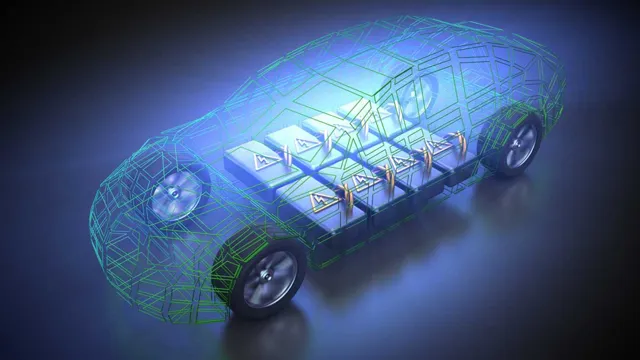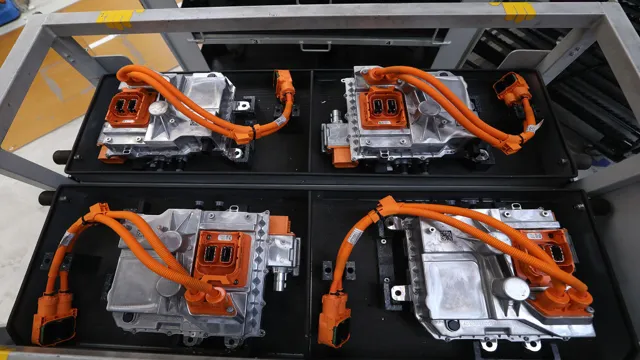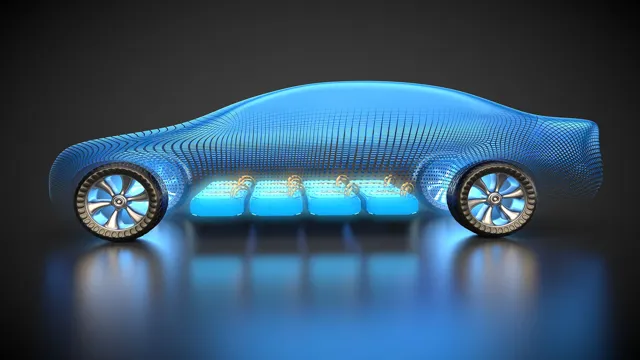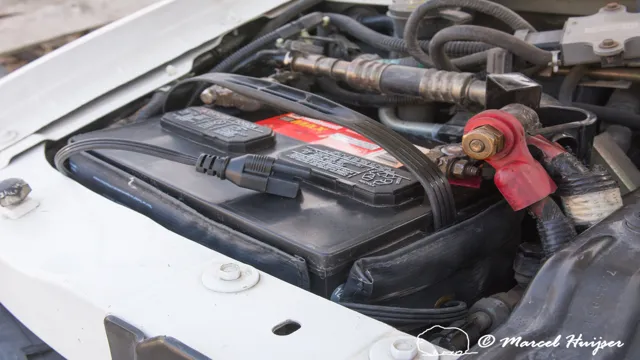Revolutionizing Transportation: The Rise of Electric Car Batteries as the Ultimate Power Source
Have you ever wondered why electric cars are gaining so much popularity over traditional fuel-powered vehicles? The answer: their battery as a power source. Electric car batteries have been a game-changer for the automotive industry. Instead of relying on gasoline or diesel fuel, electric cars run completely on electricity stored in the battery.
This means they produce no emissions or tailpipe pollution, making them an environmentally friendly and sustainable transportation option. As we continue to prioritize clean energy and sustainability, the adoption of electric cars is set to skyrocket. In this blog post, we’ll dive deeper into the benefits of using electric car batteries as a power source and why they may be the future of transportation.
What is an Electric Car Battery?
An electric car battery is the main power source for electric vehicles. It’s essentially a rechargeable lithium-ion battery that stores and releases electrical energy to power the car’s motor. These batteries have made great strides in recent years, becoming more energy-dense and efficient, allowing drivers to go longer distances before needing to recharge.
One of the great benefits of electric cars is their low environmental impact, as they produce no tailpipe emissions and rely entirely on electricity. The downside is that electric cars still take longer to recharge than filling up a gas tank. However, as battery technology continues to evolve and charging infrastructure improves, it’s becoming increasingly feasible for electric vehicles to travel long distances with minimal stops.
With advances in electric car battery technology, it’s exciting to think about the possibilities for the future of transportation.
Explaining the Technology
An electric car battery is the power source that drives an electric car. It operates as a rechargeable battery and provides electricity to the electric motors that propel the car. The most common type of battery used in electric cars is the lithium-ion battery.
These batteries consist of a series of cells, each containing a positive and negative electrode, separated by an electrolyte. The battery’s ability to store energy allows the electric car to travel longer distances without needing a recharge. Additionally, electric car batteries have a range of safety features built-in, including thermal management systems that prevent overheating, and a battery management system that regulates the charging and discharging of the battery to prolong its life.
Overall, the electric car battery is a crucial component of electric vehicles, enabling them to be more environmentally friendly and efficient compared to traditional gas-powered cars.

Benefits of Using Electric Car Batteries as a Power Source
Electric car batteries are advanced, rechargeable lithium-ion batteries that power electric vehicles. These batteries can hold energy for a more extended period, providing longer driving range. One significant benefit of using electric car batteries as a power source is that they are environmentally friendly.
Compared to traditional vehicles, electric cars do not emit harmful pollutants into the atmosphere, reducing carbon footprint and contributing to cleaner air. Additionally, using an electric car battery as a power source leads to reduced costs in the long run. While electric vehicles have a higher upfront cost than conventional cars, the price of charging and maintaining an electric car is more affordable, making it cost-effective in the long run.
The batteries used in electric cars can also be utilized as a portable power source. In case of power outages, these batteries can power homes and other devices, making them versatile and efficient. In conclusion, electric car batteries have various benefits, making them an appropriate choice for those who are environmentally conscious and looking to cut down costs associated with gasoline-powered vehicles.
Application of Electric Car Batteries as Power Sources
Electric car batteries are not just limited to powering vehicles- they can also be used as power sources for other devices. With the increasing demand for sustainable energy solutions, electric car batteries are becoming more common in homes and businesses. One example of this is Tesla’s Powerwall, a rechargeable lithium-ion battery that stores electricity and can provide power during outages or peak energy usage times.
These batteries can also be used as backup power for homes and businesses with renewable energy sources, such as solar panels. Additionally, electric cars themselves can be used as power sources, with some models equipped with bidirectional charging capabilities that allow them to transfer energy back to the grid. While the initial cost of these batteries may be high, they can lead to significant cost savings in the long run and contribute to a more sustainable future.
Residential and Commercial Use
Electric car batteries are not just for powering vehicles anymore! These batteries are becoming an increasingly popular power source for residential and commercial use. The main advantage of electric car batteries is that they are rechargeable and can store large amounts of energy. This makes them ideal for powering homes and businesses, particularly during peak energy consumption times.
The batteries can be charged during non-peak hours, such as at night, and then used during peak hours to reduce reliance on the grid and save money on energy bills. Additionally, in the event of a power outage, electric car batteries can provide backup power to keep the lights on and essential appliances running. The flexibility and versatility of electric car batteries make them a valuable asset for any home or business looking to reduce energy costs and increase energy security.
Vehicles and Transportation
Electric car batteries have been used traditionally as a power source for electric vehicles. However, with the continuing advancements in technology, these batteries are finding applications beyond the realm of transportation. One of the latest applications is the use of electric car batteries as power storage solutions.
This allows for the efficient use of renewable energy sources that may have an intermittent power supply. Homes, businesses, and power grids can now use these batteries to store excess green energy that can be used during power shortages or when the renewable source is not available. This technological solution is helping to create an environmentally sustainable future with reduced reliance on non-renewable energy sources.
As more people adopt this energy storage solution, it is expected that the cost of electric car batteries will reduce significantly, making the technology more accessible for all.
Renewable Energy Storage
Renewable Energy Storage, Electric Car Batteries, Power Sources. Electric car batteries have the potential to be a game-changer in the field of renewable energy storage. These batteries are capable of holding a massive amount of energy that can be used to power homes and businesses during peak periods of energy demand.
One of the most significant advantages of using electric car batteries as power sources is their ability to increase the stability and reliability of the energy grid. With the rise of solar and wind power, there are times when the electricity generated exceeds demand. At the same time, there are times when the demand is greater than the amount of energy generated.
By utilizing electric car batteries during these peak times, the grid can maintain a balance between supply and demand. This will ultimately lead to a more efficient, cost-effective, and sustainable energy infrastructure. Moreover, electric car batteries can be used as an emergency backup power source during power outages.
It’s like having a generator that doesn’t rely on fossil fuels and can provide electricity for days. In conclusion, electric car batteries have the potential to play a crucial role in the development of modern energy storage systems, making the overall energy infrastructure more efficient and sustainable.
Advancements in Electric Car Battery Technology
Electric car battery technology has been advancing rapidly in recent years, making it a more reliable and efficient power source for vehicles. With improvements in battery chemistry, structure, and manufacturing processes, electric car batteries are now able to deliver more energy and last longer than ever before. One major innovation is the use of solid-state batteries, which promise higher power density, faster charging, and enhanced safety compared to traditional lithium-ion batteries.
Another promising technology is the development of wireless charging systems, which could eliminate the need for cables and plugs altogether. As electric cars become more mainstream, it is likely that we will continue to see further advancements in battery technology, making them an even more appealing alternative to gas-powered vehicles.
Tesla’s Innovation
Tesla, electric car battery technology Tesla has been the driving force behind many advancements in the world of electric cars. One of the most significant areas of innovation has been in electric car battery technology. Tesla’s battery technology is more efficient than ever, allowing for longer ranges and faster charging times.
The company has also developed a unique cooling system for their batteries, which helps to prevent overheating and increases the lifespan of the batteries. Furthermore, Tesla has made strides in creating more sustainable batteries by eliminating the need for cobalt, which is unethical to mine and often linked to child labor in the Congo. These innovations have made electric cars more accessible and practical for everyday use, as they now have a comparable range to traditional cars.
With Tesla leading the way, the future of electric cars looks promising and environmentally friendly.
Other Innovations and Future Developments
Electric car battery technology is continuously advancing, with innovators striving to make these batteries more efficient, cost-effective, and long-lasting. One of the latest breakthroughs in this field is the use of solid-state batteries, which have the potential to offer longer range, faster charging times, and improved safety. These batteries do not rely on liquid electrolytes or flammable materials, making them less prone to overheating and exploding.
Additionally, researchers are exploring the use of alternative materials like silicon in the electrodes, which could increase the amount of energy that can be stored in the battery. With these advancements, it is foreseen that electric cars will become more accessible and user-friendly, and the demand for fossil fuels will decrease, ushering in the age of sustainable transportation.
Conclusion
In conclusion, electric car batteries are the perfect example of how technological advancements are paving the way for a more sustainable future. Not only do electric cars use renewable energy to power their batteries, but the batteries themselves are recyclable and have the potential to provide energy storage for homes and grid systems. With electric cars, it’s not just about the journey, but the destination; a cleaner, greener planet for future generations.
As they say, it’s not rocket science, it’s battery science!”
FAQs
What is an electric car battery?
An electric car battery is a rechargeable battery used to power electric vehicles.
How do electric car batteries work as a power source?
Electric car batteries work by storing electrical energy, which is used to power the electric motor that drives the car.
What is the lifespan of an electric car battery?
The lifespan of an electric car battery depends on various factors, such as the type of battery, usage patterns, and maintenance. Typically, they can last for several years before needing replacement.
Can electric car batteries be recycled?
Yes, electric car batteries can be recycled. The recycling process involves extracting valuable metals, such as lithium and cobalt, from the battery and reusing them in new batteries or other products.





